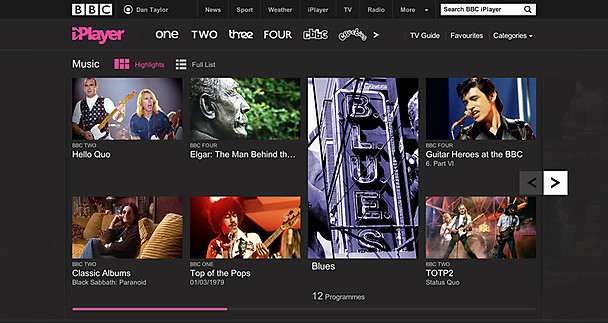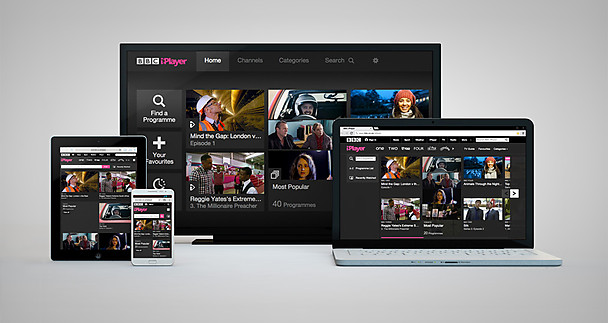Today BBC took the covers off a new version of its on-demand iPlayer, the first time that it has been rebuilt since 2011 (it was launched in 2007) — with improved search, responsive design and more iPlayer-exclusive content. The web and TV versions are going live today.
The iPlayer mobile and tablet apps will be updated with the new interface in the coming months, Dan Taylor, head of iPlayer, said in a press conference today.
There will also be more controls coming on, for those who want to partake in more of the new features. “Doing all of these things [personalization and so on] requires you to be signed in,” noted Ralph Rivera, director of future media for the BBC, speaking at a press event to announce the new service. Rivera highlighted the role of playing in a wider “ecosystem” that comes with additional features but, for now at least, the BBC will not require all users to sign in to use the service. (Prior to the redesign, the BBC offered but didn’t require users to sign in, too.)
Later on, Rivera continued on this theme to underscore where the BBC sits on privacy and data protection. “When we look at privacy we have established that we will be the gold standard,” Rivera said. “We can do that because we don’t want the data for anything other than to provide great content, not to personalise for advertising… We’re setting a high bar for data. We’ll be establishing principles and specific standards.”
Also at the press conference, Tony Hall, director general of the BBC, described the iPlayer today as a “metaphor for the BBC, a new way to experiment [offer an] ‘open and inclusive’ ‘staging place for talent’ and ‘an opportunity to innovate and challenge.'” And indeed, you can see how the BBC’s own homepages are slowly merging to become a more uber-functional media playing platform.
The next steps, Taylor said, will be to launch online-only channels and more personalization features. This will kick off with BBC3, once a digital TV channel, becoming an online-only channel.
The iPlayer service, which is free to use in the UK and paid for by license holders, is currently available across some 1,000 devices and has 10 million program requests daily. The features being turned on today will come up automatically when tablet or smartphone visitors in the UK visit the iPlayer page through a browser. For those who visit from a computer or smart TV, they will be prompted with a option of using the older or newer player — with the newer player coming with some survey questions for selected viewers, an iPlayer spokesperson told me today during a demo.
The move comes behind a huge rush of interest in on-demand programming from other OTT providers like Netflix — but also much higher demands for what people want to get from their digital video services. Taylor notes that some 42% of users arrive without a specific program in mind, so BBC has created a new recommendation algorithm and search feature.

While BBC has refreshed its home page and pages for individual channels, some of the newer features point to how the BBC is aiming to make the service far more interactive and in keeping with developments from other leading OTT content providers.
Among those are “Collections”, where people can now better browse for shows by season, event or theme. As Taylor points out, there have been some collections on the iPlayer already, specifically via BBC Four, “but they’ve been difficult to find in iPlayer. The new iPlayer enables us to showcase those collections on an ongoing basis.”
Similarly, BBC has updated how it lets users play back programs, or as Taylor puts it, “what users are looking to do before, during and after viewing.” Expect to see more features get added here to play up the concept of “second screen.”
It’s also using a new version of the BBC’s Standard Media Player which the BBC promises will improve the playback experience now and over time through the use of plug-ins to tag shows as favorites and to cue up subsequent episodes.
This is also where the role of native apps will come into their own in coming months. While the responsive web design will mean that the BBC can offer anyone with a PC, tablet, smartphone or connected TV an iPlayer experience, the native apps will let it expand that even further. For example, a user will be able to receive push notifications when a new episode of a series he/she likes has been added, and people will be able to watch series starting on one device and continuing on another. Old features for some services, but still yet to reach Auntie.
As with the iPlayer up to now, the app is available under a freemium subscription in selected European countries such as France, while the web version is geofenced so that users outside of the UK cannot access it. It’s not clear if these international versions of the native apps will also be updated at the same time. Today, the spokesperson emphasized that the news is about changes to the UK editions.
